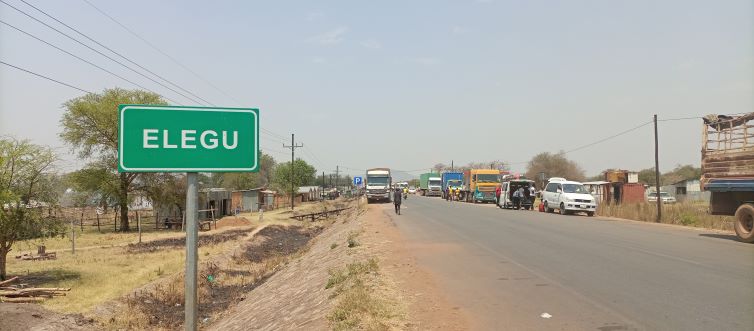Elegu Township in dry season –Photo by Jesse Johnson James
Susan Afoyocan’s fear of losing her restaurant business started when she saw the first drops of rain.
It was at the onset of the rainy season last month, as the farming communities eagerly began preparing their gardens that she knew she had to do something about these warning signs. Last year, around the same time, heavy rains destroyed Afoyocan’s local eatery and washed away her fruit stall in the process.
And now the 33-year-old was determined to protect her source of livelihood as she set about renovating and remodeling her restaurant as a measure to mitigate the floods.
“I know what happens when it rains here heavily…” Afoyocan, a mother of three, said as she instructed local laborers who were busy carrying tin roofs for covering her restaurant.
“I have to act very fast now or else I will lose everything again.”
As climate changes continues to take toll on Uganda –and globally— the adverse effects of the extreme weather—characterized by erratic rains and raging floods—have triggered growing concerns from climate activists and civil society organization (CSOs) who blame the government of failing to build infrastructures and enforcing preventing policies (such as tree planting along river banks and flood plains to act as a drag on flood waters) that protect disaster–prone areas like Elegu.
The business community operating at the border town have for years continuously battled the raging floods, especially during the rainy season. River Unyama, a nearby water course which often bursts its banks, has also on many occasion not spared the low-lying border town whenever it rains heavily. In November last year, more than 700 people were displaced by floods, and eight others killed, leaving 2,000 acres of crops destroyed following heavy rains in the marshy border town.
Revenue washed away
And now local leaders are accusing the government of making ‘empty promises’ instead of addressing the problem urgently. In 2018, government signed a Memorandum of Understanding (MoU) with the Ministry of Trade and Industries for the 18 billion shillings-project meant to mitigate floods in Elegu. The project, funded by Trade Mark East Africa, was meant to widen the banks of River Unyama to improve the drainage system at Elegu Town.
But four years later, nothing has been done except for only the feasibility study that was carried out by an engineering team at the construction site.
“We were promised air and now the rains are back [again],” said Bosco Onen who works at a retail shop. “For how long shall we wait while we suffer?”
Elegu, a border town with a population of close to 12,000 people, is the biggest revenue earner for Amuru district. Operations by Amuru’s local government fail to run smoothly due to financial constraints resulting majorly from the low revenue collections from the local businesses that are affected by floods.
‘[Trade ministry officials] are not feeling the pinch of the suffering of our community members whose businesses are affected [by] floods,” said Michael Lakony, Amuru District Chairman, adding, “[They should] come to our rescue…in making sure that we curb the disaster.”
There is also information deficit regarding the progress of the project. And at moment, the Trade Ministry officials are being accused of being cagey— when it comes to giving out information about the project— by local leaders who claim they’ve been left in the dark for most of the time.
When this reporter contacted Julius Kasirye, the Project Manager for Border Export Zone–BEZ under the Ministry of Trade and Industries for comment, said:” …the matter can only be best responded to by either the Permanent Secretary [of] the Minister of Trade and Industry.”
The Trade Ministry Permanent Secretary didn’t respond to our repeated phone calls either.
But for now, as the rainy season continues to pound on, the business community at Elegu have to remain resilient and survive on their own as they wait for government support. On a recent day, as the clouds began to open up, a group of young women rushed to collect pieces of cassava spread outside on thin plastic paper for sun drying. Nearby, a young mother was busy rebuking some of kids who were playing outside in the middle of the chaos.
“If nothing is done [to help us], we will keep suffering,” said Afoyocan.








